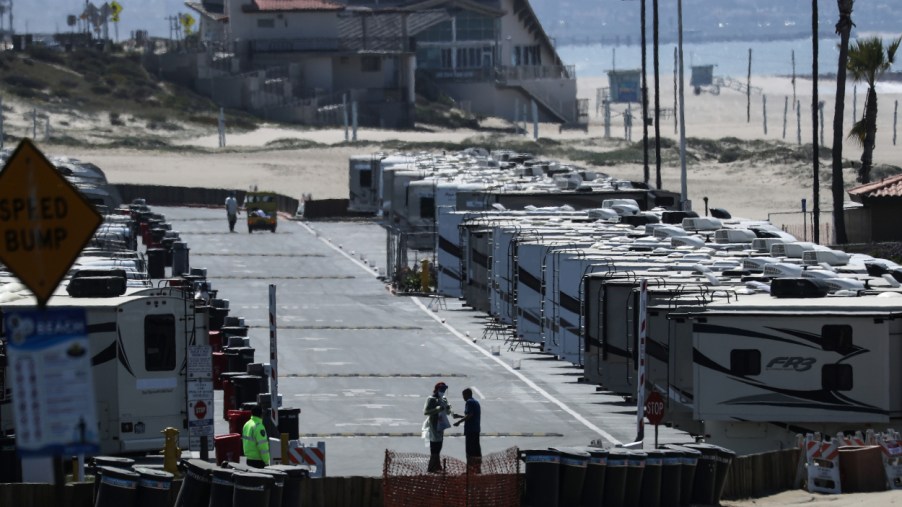
New Laws in California Could Be Trouble for Diesel RV Owners
Having enacted many laws and regulations over the years to curb the emission of greenhouse gases (GHGs), California has long been known as one of the most active states in the fight against climate change. Whether these regulations are good, bad, or in-between, consumers’ perspectives are often significantly influenced by the type of vehicle they drive. Some diesel RV owners may be bristling right now at a new proposed law that could spell big trouble for them.
California’s emissions regulations
The sprawling state of California is home to nearly 40 million people and some of the cities with the worst air quality in the world. California has several unique features that contribute to its high levels of air pollution, including its large population, mountains, and hills that help trap pollutants, seasonal wildfires, and a warm climate that contributes to ozone formation.
The 1963 Clean Air Act granted the Environmental Protection Agency (EPA) the authority to regulate state emissions standards. However, air pollution had become a significant issue in the state two decades earlier, with residents demanding the state deal with the smog that had begun to emerge in major cities.
As a result, California passed emissions standards that are stricter than those required by the federal government and, as such, have been granted an exemption from EPA regulations.
Since its establishment in the ’60s, California’s Air Resources Board (CARB) has issued numerous regulations concerning vehicle emissions, as transportation emissions are the largest source of GHGs in the nation.
By 2035, California hopes to move to 100 percent zero-emission vehicles and phase out remaining diesel vehicles by 2045. Along with the California General Assembly, CARB has aggressively targeted diesel-powered vehicles, given that they produce more GHG than gasoline-powered ones.
The new law regulating diesel RV emissions
A recently approved law should be of specific interest to diesel RV owners. Senate Bill 210 directs CARB to develop a “Heavy-Duty Vehicle Maintenance and Inspection Program” applicable to all vehicles greater than 14,000 pounds operating in California.
In short, these vehicles will have to follow California’s emissions standards and hold an annual certificate from CARB validating their vehicle meets these standards. This regulation will apply no matter where the vehicle was registered, according to Camper Report.
Senate Bill 210 directs CARB to establish this program starting with a pilot, followed by a full inspection program. The inspection program will be coordinated with the California Department of Motor Vehicles and include procedures for both visual and functional inspections and necessary emissions testing. Those who do not comply would be assessed fees, and penalties CARB establishes.
This proposal is one of many CARB measures intended to curb diesel emissions from trucks, both operating in-state and out-of-state. But it also has implications for diesel RV motorhomes owners residing in California, along with owners traveling to and from the Golden State.
It very well could reduce emissions significantly. But it could also have adverse business impacts on the transportation and tourism industries.
Public reaction to Senate Bill 210
California’s Governor Gavin Newsom approved this bill in September 2019. And while the long on-ramp for implementation of the law (coupled with the pandemic) may have muted public reaction, industry and environmental groups have, and continue to, weigh-in.
Environmental groups, such as the Coalition for Clean Air, and health advocacy organizations such as the American Lung Association, voiced their support for the bill during its consideration by the California General Assembly and after its passage.
The California Trucking Association (CTA) initially lobbied against the bill, especially as its initial form did not include a cost for the certificates. According to Trucks.com, when the bill was revised to cap certificate costs at $30, the CTA took a neutral position.
However, other industry groups within the transportation and agriculture industries, including the California Farm Bureau Federation, California Cattlemen’s Association, and Western States Trucking Association, oppose the law, as per CDLLife.
Senate Bill 210 could put a damper on what has been a historic period of RV sales. The RV Industry Association has also taken note of the bill. It plans to work with CARB to ensure that the development and implementation of Senate Bill 210 do not unduly burden diesel motorhome owners in or visiting California.
As of now, the certificate requirement is not yet in effect but is expected to be effective sometime in 2023. So if you own a diesel-fueled motorhome and were planning on one of California’s many RV parks, you may want to do so soon.


